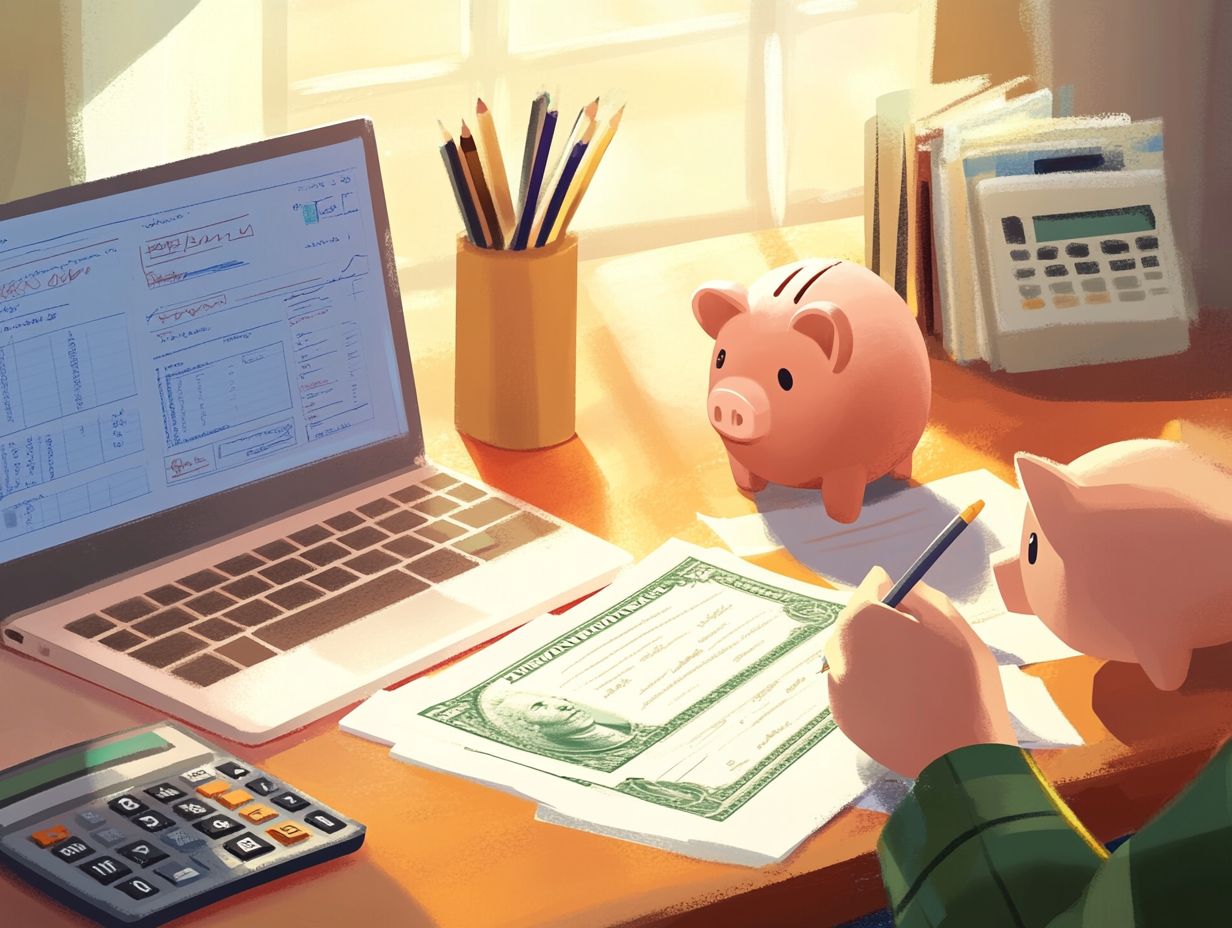Tips for Building Your Savings While Paying Off Debt
In today’s fast-paced financial world, you really need to understand the balance between savings and debt repayment if you want to achieve financial stability.
Whether you’re dealing with student loans, credit card debt, or trying to build up an emergency fund, this article will help you evaluate your current financial situation and create a practical budget that works for you.
You’ll find effective strategies to grow your savings while managing your debts, tackle those unexpected expenses that pop up, and figure out when it might be a good idea to seek professional advice.
Take the steps you can today to secure a more stable financial future!
Understanding the Importance of Savings and Debt Repayment

Understanding the importance of savings and debt repayment is key to achieving financial stability in your life.
When you effectively manage your savings and actively tackle your debts, you’re laying the groundwork for long-term financial wellness and security.
This means recognizing how vital an emergency fund is and strategically planning your financial goals while keeping an eye on your spending habits and how you allocate your income.
Plus, making informed decisions about interest rates and getting a grip on your credit score can really boost your financial planning efforts.
This all leads you down the path toward financial independence and saying goodbye to debt for good.
Why Both are Crucial for Financial Stability
Both savings and debt repayment are crucial for your financial stability, working together to help you secure a bright financial future and reach your goals.
When you prioritize savings, you create a safety net that shields you from unexpected expenses, like medical emergencies or job losses. Plus, those savings can grow over time thanks to interest accumulation.
Just think about it: if you manage to save a small percentage of your monthly income, after a few years, you could have a nice chunk of change for a down payment on a house or to help fund your child’s education.
On the flip side, having effective debt repayment strategies—like the snowball method or debt consolidation—can seriously reduce your financial stress. Imagine consolidating high-interest credit card debt into a single lower-interest loan; it not only simplifies your payments but also saves you money on interest.
This way, you can focus more on building your savings and making smart investments.
Assessing Your Current Financial Situation
Assessing your current financial situation is the first step to getting your money management game on point and reaching your financial goals.
You’ll want to take a good look at your income streams, get a grasp on your expenses, and evaluate your debt-to-income ratio.
This way, you can gain a clear picture of your financial health.
Evaluating Debt and Income

Evaluating your debt and income is key to understanding your financial landscape and making smart decisions about your financial planning.
By categorizing your debts into different types—like credit cards, student loans, or mortgages—you can easily pinpoint which areas need your immediate attention and strategize accordingly. Simultaneously, taking a close look at your various income sources can help you spot potential fluctuations and opportunities for improvement.
Tracking your expenses diligently is crucial for successful budgeting and managing debt. When you know where your money goes each month, it becomes much easier to identify areas where you can cut back.
Using practical tools, like budgeting apps or even simple spreadsheets, can make this process smoother and give you a clearer view of your financial health. This way, you can plan more strategically for reducing your debt.
Creating a Budget for Savings and Debt Repayment
Creating a budget for your savings and debt repayment is a crucial step that sets you up for financial stability and discipline.
By using effective budgeting techniques, you can prioritize your financial goals and make sure you’re putting enough money towards both saving and managing your debt.
It’s all about striking that balance so you can reach your financial dreams!
Tips for Budgeting Effectively
Effective budgeting is essential for managing your finances and reaching those savings and debt repayment goals. There are some practical tips that can really help you enhance your budgeting process.
One of the most important steps in this journey is getting familiar with various expense tracking tools that can simplify things for you. By using apps or spreadsheets, you can get a clearer picture of your spending habits, which will help you spot areas where you can cut back.
Setting realistic savings goals, like aiming to save a fixed percentage of your income each month, can make a big difference in building a successful budgeting routine.
Plus, adopting cost-cutting strategies—like meal prepping or canceling subscriptions you never use—can lead to significant financial relief. This enables you to stay on track and reach your budgeting objectives more easily.
Strategies for Building Savings While Paying Off Debt

Building your savings while also tackling debt can feel like a juggling act, but with the right strategies, you can pull it off.
By zeroing in on maximizing your income and trimming down on unnecessary expenses, you can strike a balance that lets you save effectively while handling your debt repayment.
It’s all about finding that sweet spot!
Maximizing Income and Cutting Expenses
Maximizing your income while cutting expenses is a powerful strategy that can really help you build savings and manage your debt more effectively.
By exploring different ways to earn extra cash—like diving into side hustles such as freelance work or even launching an online business—you can tap into new financial opportunities. Passive income streams, such as investing in dividend stocks or creating digital products, can also bring in revenue with minimal ongoing effort.
Regarding cutting expenses, practicing mindful spending is key. Take a good look at your daily habits, use budgeting apps, and identify those pesky subscriptions you don’t even use; you’ll be amazed at how much you can save.
Implementing cost-cutting strategies, like meal prepping and sticking to a shopping list, encourages you to reassess your spending patterns and focus on what really matters.
Dealing with Unexpected Expenses and Emergencies
Regarding handling unexpected expenses and emergencies, you really need a proactive approach to your financial management.
Having an emergency fund is essential for managing those risks and keeping your finances on track.
How to Handle Financial Setbacks

Handling financial setbacks effectively is key to keeping your financial health in check, and it often means taking a fresh look at your financial planning strategies.
When unexpected expenses pop up, the first thing you should do is take a closer look at your budget. By categorizing your spending and spotting areas where you can tighten the belt, you’ll get a clearer picture of where you stand financially.
It’s also smart to adjust your savings goals; even small contributions can add up over time and give you a nice cushion for future emergencies.
Don’t forget to reassess your debt repayment plans too—this can help ease some immediate pressure. For example, looking into options like consolidation or renegotiating terms can lead to more manageable payments, which is great for your overall financial health.
Stay resilient! Remember, many people have bounced back from similar situations by taking a proactive approach and seeking professional advice when needed.
Seeking Professional Help and Advice
Getting professional help and advice can really change the game for you when it comes to achieving financial stability, especially if you’re facing complex situations like managing debt or planning investments.
When to Consider a Financial Advisor or Counselor
Knowing when to hire a financial advisor or counselor can really boost your financial literacy and overall financial health.
For example, if you’re feeling overwhelmed by crushing student debt or navigating the maze of personal loans, a financial professional can help you untangle those complexities and create a repayment plan that works for you.
As retirement approaches, it’s natural to wonder if your savings will be enough. In those moments, expert advice can illuminate the best investment options and savings strategies tailored to your personal goals.
Ultimately, weighing the costs of professional guidance against the potential long-term benefits could be a game-changer in your financial journey.





